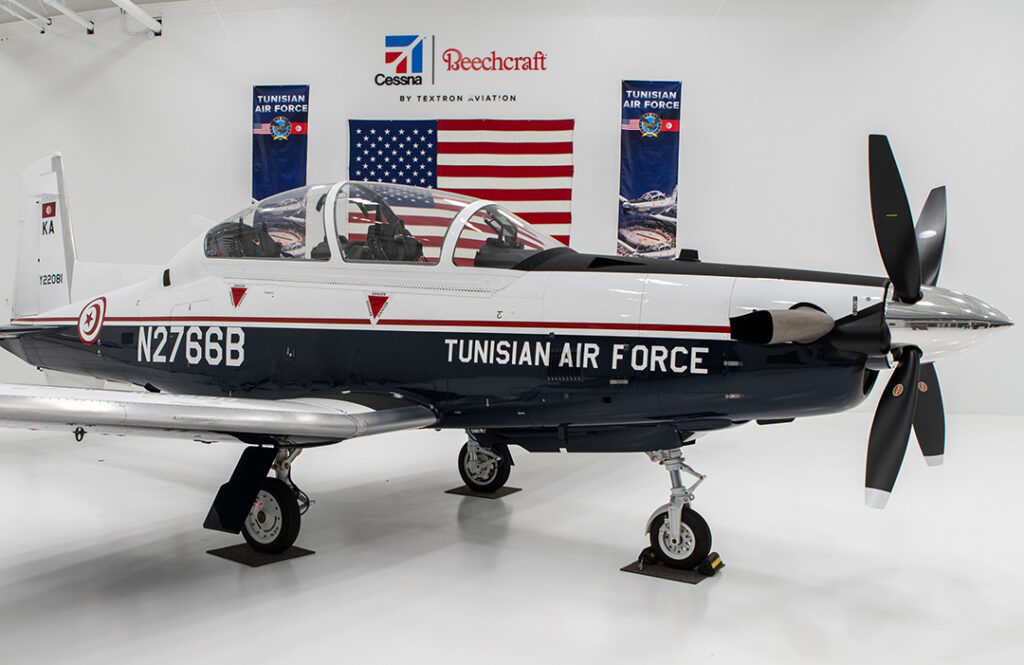ADF STAFF
The Tunisian Air Force has received the first batch of eight Beechcraft T-6C Texan II trainer airplanes from the United States. The remaining four are expected to be delivered later in August.
Designed and manufactured by Textron Aviation Defense, the T-6C is a single-engine turboprop aircraft with an approximate 10-meter wingspan and an all-digital, pressurized glass cockpit that offers pilots an unobstructed view. Other features include ejection seats, collision-avoidance and ground proximity warning systems, and an on-board oxygen system that provides supplemental oxygen for the pilots.
“Becoming a regional leader in military flight training excellence is one of the milestones on the path to achieving our counterterrorism and border security mission requirements,” Gen. Mohamed Hajjem, the Tunisian Air Force chief of staff, said in a news release.
Tunisian Defense Minister Imed Memich said the new aircraft will provide the air force with advanced training capabilities.
The T-6Cs will be flown by the Tunisian Air Force’s No. 13 Squadron at Sfax Air Base/Sfax-Thyna International Airport. The aircraft are augmented by a ground-based training system, an operational flight trainer and a computer-based training lab. Tunisian pilots began training on the aircraft at Textron Aviation Defense facilities in Wichita, Kansas, in late October 2022, according to defenceWeb.
“As far as what Tunisia might use a better-trained pilot for, it would most likely be about interdiction of smuggling, though there’s a low but existent risk of needing air power to disrupt terror bases that might emerge in neighboring Libya,” Ryan Bohl, a Stratfor Middle East and North Africa Analyst at Rane, a global risk intelligence company, told Breaking Defense.
The T-6C aircraft will replace Tunisia’s aging L-59T Super Albatross advanced trainers. The U.S. contract includes in-country field service and logistics support, program management support, interim contractor support for the first year, training for pilots and maintenance personnel, spare engines, spare parts, and aircraft support equipment, according to Breaking Defense.
Terrorism threats in Tunisia have significantly declined in recent years due to increased security investment and capabilities.
Militants have attacked periodically in Tunis, the capital city, but most terrorist operations are in the central-western highlands near the Algerian border, according to Crisis24. There is high security at the country’s southern border due to cross-border smuggling, terrorist activities and threats from Libya.
Terrorists also are known to attack Tunisian tourist destinations. Five people were killed in an attack on a historic synagogue on the Tunisian island of Djerba on May 9. A military plane flew the victims to a military hospital in Tunis.
Tunisian President Kais Saied condemned the attack as a “cowardly criminal operation” and insisted that criminals will not be able to sow divisions in Tunisian society.
“There is a state and institutions, and the Tunisian people know very well the schemes of these criminals,” Saied said in a report by The Jerusalem Post. “They expose themselves every day. Our state is strong with its institutions, its security and military forces, and its conscious and alert people. Whoever works to cast doubts on the state’s capabilities is delusional.”
The synagogue previously was targeted in an attack by an al-Qaida operative that killed 19 people, mostly tourists, in April 2002.

